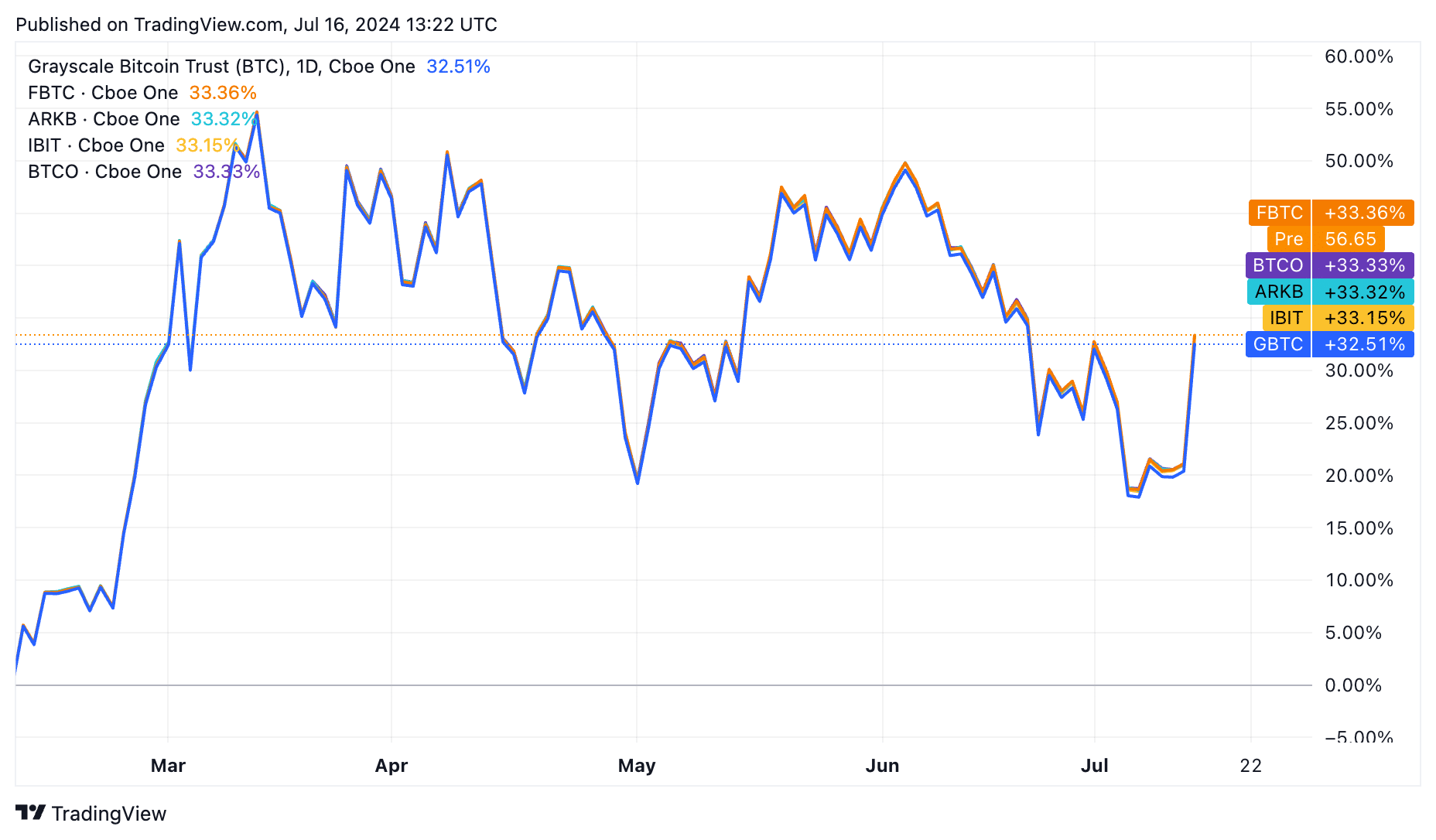
Spot Bitcoin (BTC) ETFs are doing well as their inflows accelerate, helped by institutional and retail investors.
Data shows that ETFs, which were launched earlier this year, have added over $16.16 billion in inflows this year. This trend has beaten Bloomberg’s 12-month estimate of between $12 billion and $15 billion.
Blackrock’s iShares Bitcoin Trust (IBIT) leads the market, having accumulated over 316k coins valued at over $18 billion. Fidelity’s Wise Origin Bitcoin Fund (FBTC) follows with over 176k coins. Other notable Bitcoin ETFs include Cathie Wood’s ARKB, Bitwise’s BITB, and Invesco’s BTCO, holding 47,765, 39,420, and 7,197 coins respectively.
In contrast, the Grayscale Bitcoin Trust (GBTC), which was once the largest Bitcoin ETF, has seen a significant outflow, losing over 18,000 coins this year. This decline is attributed to its high fees, with an expense ratio of 1.50%, compared to Blackrock’s IBIT which charges just 0.25%. For instance, a $100k investment in GBTC incurs $1,500 in annual fees, whereas the same amount in IBIT would only cost $250.

Additional data shows that some of the biggest institutional investors have bought these Bitcoin ETFs. A report published on Monday showed that funds like Millenium Management, Susquehanna, Horizon Kinetics, and Jane Street have bought Bitcoin ETFs. The other notable companies were Fortress Investment, Apollo Global, and Farallon Capital.
Millennium is a $68 billion fund managed by billionaire Izzy Englander while Apollo Global is one of the top private equity firms in the world. Susquehanna is owned by a Trump ally and one of the biggest investors in TikTok.
— Ki Young Ju (@ki_young_ju) July 15, 2024Even just combining the 80 companies found manually in SEC filings accounts for 17% of the total ETF holdings.
While not all can be considered institutional investors, significant numbers are included.
Viewing ETF inflows solely as retail contributions seems inappropriate. https://t.co/r5j5YWH3Gs
Will Ethereum ETFs see similar success
These numbers came at a time when investors are waiting for the approval of spot Ethereum ETFs. Analysts expect that this approval will happen this month.
On paper, ETFs tracking Ether should do well since the coin has a long history of beating Bitcoin. Ethereum has soared by over 1,654% in the past five years while Bitcoin has risen by 587% in the same period.
Also, Ether is one of the most liquid cryptocurrencies in the industry while Grayscale Ethereum Trust (ETHE) has added almost $10 billion in assets. It is a highly expensive fund with a management fee of 2.50%.
As was reported earlier, spot Ethereum ETFs will be ideal for institutional investors who might struggle to deal with the cold wallet keys.
Retail investors, who will invest in these funds will pay a fee and also miss out on its staking reward. Most funds will likely charge an expense ratio of 0.25%. Data shows that Ethereum has an annual yield of about 3.26%, meaning that Ether investors will do better than ETF holders.
Therefore, there is a likelihood that spot ETH ETFs will lag behind Bitcoin in terms of asset inflows.
